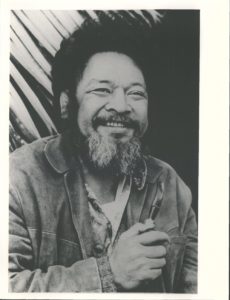Epeli Hau’ofa (1939–2009) was a Tongan and Fijian writer and anthropologist. As a writer, Hau’ofa fully took advantage of postmodernism’s movement across fiction and nonfiction. His output spans a diversity of genres – poetry, novels, satirical short stories, non-fiction – and even included the foundation of a literary journal.
In social theory, Hau’ofa’s is primarily known for his creative rewriting of imperialist tropes of Oceania and of the ocean. His re-conceptualisations are what Sudesh Mishra, in a response to Hau’ofa’s work, describes as ‘celebratory resistance’ (1993): a celebration of that which is regarded as a developmental deficit. Accordingly, Hau’ofa’s work responds to the imperialist view of Oceania as scattered, isolated entities in need of external confinement and guidance. In his work, the ocean becomes a space of connection and intimacy, and the traffic between islands a cultural and economic advantage. In his iconoclastic essay Our Sea of Islands (1993), he writes:
“Oceania is vast, Oceania is expanding, Oceania is hospitable and generous, Oceania is humanity rising from the depths of brine and regions of fire deeper still, Oceania is us. We are the sea, we are the ocean, we must wake up to this ancient truth and together use it to overturn all hegemonic views that aim ultimately to confine us again, physically and psychologically, in the tiny spaces which we have resisted accepting as our sole appointed place, and from which we have recently liberated ourselves. We must not allow anyone to belittle us again, and take away our freedom.”
As this statement suggests, Hau’ofa’s views are fierely anti-colonial, with particular attention to the ‘three Cs’: ‘colonialism, Christianity and capitalism’ (Droessler, 2016). In his opinion, these created a toxic material and spiritual dependence on the West.
An interesting aspect of Hau’ofa anti-colonial writing is his attention to space and scale. His experiments in this regard have been compared to those of fellow poets and theorists Edouard Glissant (Martinique) and Albert Wendt (Samoa), who all attempted to negotiate the desire for rootedness in place with cosmopolitan openness.
While Hau’ofa has undoubtedly contributed to anti-colonial cultural politics and practices, his work has not remained without critics. Mainly, his overly positive view of Oceania has outraged many writers who point to on-going conflicts between groups and islands, many of which date from pre-colonial times. Other critics have reproached Hau’ofa for his overly postmodern, poetic and impractical style, and it’s lack of practical solutions. Some of these critiques (as well as celebrations) have been collected in the book A New Oceania: Rediscovering Our Sea of Islands (1993). The late Pacific scholar and poet Teresia K Teaiwa has been a prominent critic and advocate of Hau’ofa’s work. For example, she has drawn attention to the fact that Hau’ofa’s work, due to its participation in, and profiting from, the postmodernist academic industry, is directed less at local cultural renewal or politics than at the Western cultural industry (1996). At the same time, she appreciates the beneficial effects of this wide circulation among people who might not otherwise have encountered anti-colonial Pacific literature and theory, and its potential use as a resource for their own struggles (1996).
Essential Reading:
Hau’ofa, E (1993) Our Sea of Islands. Dialogue (PDF Link)
Naidu, V, Waddell, E, and Hau’ofa, Epeli (1993) Oceania: Rediscovering Our Sea of Islands. Suva, Fiji: School of Social and Economic Development, The University of the South Pacific in association with Beake House.
Droessler, H (2016) Epeli Hau’ofa. In: Immanuel Ness, Zak Cope (eds) The Palgrave Encyclopedia of Imperialism and Anti-Imperialism. London: Palgrave Macmillan.
Further Reading:
Hau’ofa, E. (1998) The Ocean in Us. The Contemporary Pacific 10(2), pp. 392-410.
Genisis, S (2017) Finding My Fijian Identity Through The Ocean. Tedx Suva. (Video Link)
Teaiwa, T K (1996) 1996. Review of A New Oceania: Rediscovering Our Sea of Islands, edited by Eric Waddell, Vijay Naidu, and Epeli Hau’ofa. The Contemporary Pacific 8 (1): 214-17. (PDF Link)
Questions:
Discuss the pros and cons of ‘celebratory resistance’ to colonial impositions. What are potential alternatives for rewriting colonial narratives?
How does Epeli Hau’ofa relate the local and the global? What imaginary does he arrive at?
Watch the Ted Talk by film maker Selina Genisis and discuss how it relates to Epeli Hau’ofas ideas.
What is the value of Epeli Hau’ofa’s ideas today? Are they really just an outdated example of playful postmodernism or do they still have theoretical and practical currency?
Submitted by Angela Last
Image source: https://hocken.recollect.co.nz/
